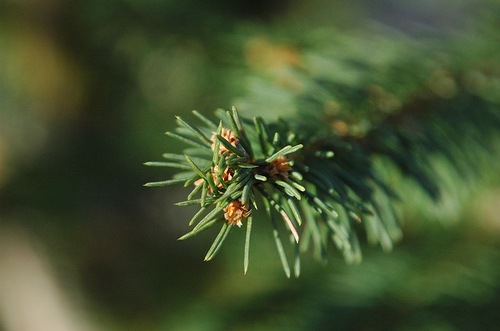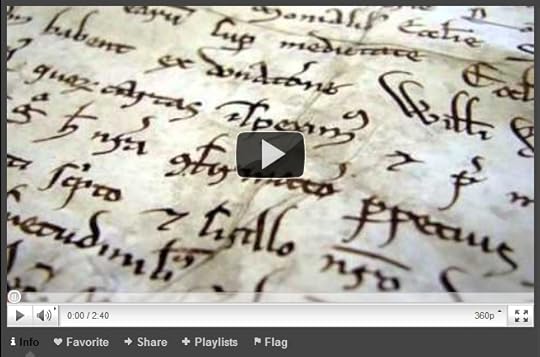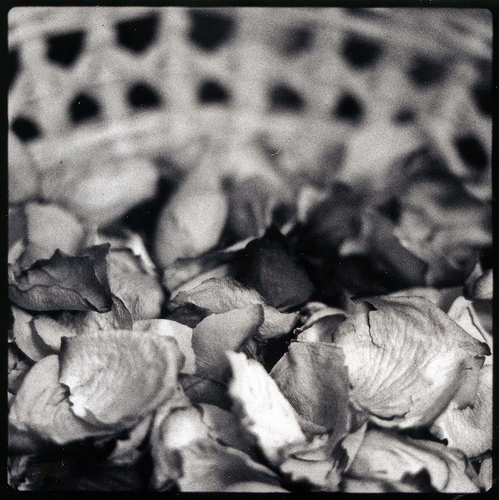L.M. Browning's Blog, page 34
January 28, 2011
Evergreen {In Honor of Imbolc}
EVERGREEN
{An Excerpt from Oak Wise in Honor of Imbolc}
I.
The Unforeseen Death
Oh, what an abandonment the first winter was,
as life withered, without expectation of return.
How spited the first peoples felt
when the warmth of their day was stolen
and the abrasive wind drove them from the merriment
into starvation.
How disconcerting
to watch the entire world die
―every plant wilt and every tree turn bare―
without explanation or apparent cause.
We had not yet established a trust with you,
had we mother.
We were the newcomers to your plains
and knew not your cycles and moods.
We knew not of the ballet
that you and your partner the sun eternally enact.
We knew not that, for a time each year,
you pull all life inward
―leaving the surface barren―
in a season called winter.
We did not realize that winter,
in its extreme,
is natural and needed
…a restorative sleep,
wherein every organism rests
after the season of growth
so to prepare for the next.
From our eyes
all we could see was death;
we did not know that the life we saw vanish
was merely hibernating within you.
II.
The Warmth of Hope
What a renewal of thy love the first spring was.
After the winter left all distraught…
after the desolation and famine,
the budding of the trees
was such an affirmation of thy care
―an answer to the prayers that had carried on
throughout the bleak days
of short daylight and long darkness
…of fleeting warm and deep cold.
…of persistent hunger and bare orchards.
We feared that you had died―
oh needed mother.
As you closed your eyes to sleep
―as you exhaled
and the trees dropped their leaves―
we feared you dead.
Wailing in hunger
without the nourishing bosom
of your land's bounty,
frozen without the shelter
of your warming presence,
we mourned you
and prepared for our own end
but then you came back.
Your lifeless body took a breath
and the buds emerged
from the tips of the withered trees.
Blood coursed through your pale body
and the yellow grass surged with green.
Your still hands stirred
and a warm wind blew in from the south.
Your eyes flickered opened
and the song of the returning sparrows
heralded your reawakening.
III.
The Distraught Orphans
During that first scare―
before we knew what was happening,
we felt scorned.
As the warm winds
of our Arcadia turned hostile
we felt as if we had been abandoned by our mother,
turned from the house before we were ready
out into a harsh reality,
for which we were unprepared.
The world had come to its end;
the days had grown darker,
nature had shed its colors
like a stiffening corpse,
the flow of fruits trickled
and then finally the coldness came.
And as the warming glow of your presence dimmed
we came to learn of those demons
darkness, cold and hunger,
which you and your symbiot the sun had kept at bay.
Swept off the hillsides
we huddled, bewildered
around the dim, seemingly forlorn hope
that you would rise up
and life could return to what it once was.
Walking through the gray, bare wood
we attended your wake
to see your plaid body set out before us.
You were gone
and we knew not what to do.
Until…
amongst the cemetery of dead trees,
we saw a gathering of survivors
―a grove of Yew still in bloom.
Taking them as a sign that you still endured,
we had reason to hope
that your warmth would one day return.
You had brought forth this family of tree
that blooms when all others wither
to be a symbol of your continued presence and care…
As if, before your laid down to take your rest,
you left behind a note for us―
assuring us that,
while you may seem lifeless,
you are not
…that while you may seem dead,
you are not
…that while it may seem you abandoned us,
you never will.
IV.
The Comforting Assurance
During your season of slumber
we are left to fend for ourselves.
Yet you do not simply abandon us;
you give us fire to ward off the demon frost
and the wisdom of preservation,
so to have a portion of your harvest
to keep us hearty until your return.
When the cold winds start cresting the hills
and creeping along the grounds of our village,
we place in the grate the fat oak Yule log
and kindle the fire to push back the threat.
We stoke the fire that brings warmth and light,
keeping the hearth with vigilance,
as if it were a candle in the window
showing our remembrance of you
during the season of your respite.
And on those coldest days
―months into the season of darkness–
when we begin to fear that spring shall not return,
we go unto that evergreen grove.
As if opening the door
of the room you sleep in
to insure that you are alright,
we touch the prickly needles
to check that they still cling steadfast to the bough;
then peel back a single scale of the bark along the trunk
so to see that reassuring glint of pale green beneath
and know that you are still there,
soon to return to us
and bring with you the return of ease.
Then, before we leave,
we take with us cuttings
from the immortally green
with which we adorn our home
in the time of dark,
so to keep in sight
the promise of your return.
________________________________________
Excerpt from Oak Wise: Poetry Exploring an Ecological Faith
2010 © L.M. Browning








January 24, 2011
Across the Distance {Visual Verse}
In response to the many people who have remarked on my poem,
Across the Distance, I have made this Visual Verse version. Please enjoy.
________________________________________








January 15, 2011
Riverway Press (New Hiraeth Press Imprint)
Recently we at Hiraeth Press celebrated the launch of the first of two imprints that will be branching over the coming year, Riverway Press. This imprint will be devoted soley to the work of our Press founder, the awardwinning author, Jason Kirkey. Kirkey Founded Hiraeth Press in 2006. He is the author of numerous works of poetry and recently won an IPPY award for his non-fiction work: The Salmon in the Spring: The Ecology of Celtic Spirituality.
The second Imprint we are expecting to launch this year is Homebound Press. This branch of Hiraeth Press will be responsible for fiction titles. The mission of Hombebound Press is to choose titles that introduce a new world-view through the birthing of a new mythology that would aid humanity in defining ourselves during this current age.
Check back for more updates.
__________________________________________________
2011 © L.M. Browning








January 12, 2011
No Going Back ~ Courage to End Abusive Relationships
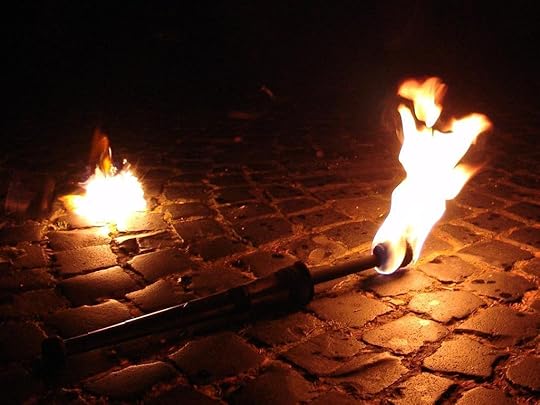
Years ago, after standing up for myself during a confrontation with a hurtful presence in my life, a phrase was said unto me by the one I was evicting from my life, "Be careful what bridges you burn…"
I recall at the time how spiteful I found that retort, as if this person was willing a harm to come upon me that might drive me back to their doorstep; however, thus was the character of the person and my reason for parting ways with them. At the time, I brushed off the comment and went on from the encounter, not giving it much thought until a few days ago, when the same phrase was said unto a friend of mine who took a similar moral stand as I.
Like my own circumstances this friend, in a moment of courage, asserted his self-worth and broke ties with those who had long been mentally and emotionally abusive toward him. He gave me a recount of this defining moment in his life and finished by saying that he had been told to, "Watch what bridges you burn." and upon hearing this I felt compelled to share with him a few conclusions I had come to at the time that I burned my own bridge.
~
"Be careful what bridges you burn, because you might be heading back this way again some day." This was the whole phrase said unto me by those who I chose to break ties with long ago. When I heard this phrase, I remember thinking to myself that there are those who make their decisions based upon convenience—what will be the "easiest" path for them long-term. And then there are those people who make their decisions based upon what their heart needs to maintain its overall well-being, regardless of any backlash that might arise as a result.
What the person who said this unto me could not understand was that, after decades of degrading, devaluing, hurtful behavior enacted towards me, there was nothing that could ever happen in my life to make me return unto them. In asserting my worth—in declaring my independence from them and saying "Enough, I deserve to be loved and will take no more abuse!", I had indeed "burned a bridge" yet the destruction of that bridge was in no way to my determent. As the bridge burned one life ended—a painful life—giving way for a rebirth to occur, in which I would rise strong and free.
My choice not to respond to this phrase when it was first flung at me was based upon my not wanting to continue going around in endless circles of debate with the person I had already lost enough of my life to. I reached that point when, it was enough that I was self-certain of my choices; I knew that there was never any chance of the one I was evicting validating my reasons for breaking with them (if they could ever take into account my own well-being, my reasons for parting ways with them would be mute.) No, at the time one truth resounded: sometimes it is necessary to burn the bridge so the devil cannot follow us.
When there are toxic people in our life who do us tremendous harm without ever caring enough about us to see the damage they have inflicted, nothing binds us to these people. Nothing obligates us to keep these people in our lives, not blood or marriage or any kind of loyalties. When love is absent from a relationship all bonds have been dissolve and we must act to preserve our life and the health of our heart/spirit.
There are those people who willfully choose to hurt us; who hold no love in their heart for us and whose presence has always been hurtful to us. People who see no fault in their actions and so feel no remorse and therefore, no reason to change their treatment of us. Such people must be broken from for the sake of our own well-being, regardless of what unknown land it means venturing into alone. And so I say unto you, when you come to the limit of what you can bear at the hands of such toxic presences, do not fear to light that torch. Bring an end to the abuse. Assert your worth and worthiness to be loved and burn the bridge.
__________________________________________________________________
2011 © L.M. Browning








January 7, 2011
The Lesson of the Day
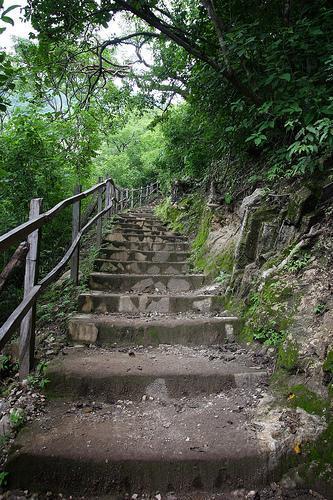
One of the many hats I wear in this life is that of a teacher of Special Education at a public High School and today I found myself deeply pondering the duties of my position.
The place of a teacher has been boiled down to the act of force-feeding facts to the children placed in our care each day, usually against their will. Most teachers believe it is their duty to explain the material composing their given subject. And the pressure teachers feel to have their students pass the Mastery Tests in light of the No Child Left Behind Act, causes most to push the facts alone, too pressed with the short-term to consider the long term. When truly a mentor's job is to spark a child's interest in our given subject within the heart of the student.
"Give a man a fish, he eats for for a day. Teach a man to fish and feed him for a lifetime." This Chinese proverb captures the true duty of a teacher. Yes, we can teach students the facts and, if we are lucky, they will retain those facts long enough to regurgitate them on our quarterly tests. Yet the reason why our children fail the more significant annual tests is that, after the monthly tests are completed the bulk of the knowledge we give them is discarded and the child's mind is absorbed in the newest technological novelty of come into their hands. The only way to teach a child–to achieve genuine and lasting comprehension–is to spur their desire to educate themselves.
Instead of anesthetize our children with numbing facts in a vain hope to drill in information they do not find interest in, we must shock them with the boundless nature of the world they live in and spur them from their despondency, awakening in them a desire this world–to explore the past and progress the future. From what I have experienced both as student and teacher, most teaching styles actually suppress the appetite for learning in a child; resulting in an adult population who are unnourished, who hold no appreciation for the gathered wisdom of the past generations, and whose intellectual and creative potential has gone undeveloped. For only when there is a desire to learn can we truly be educated.
Every child has a subject that brings them to life–an interest that they would happily give their lifetime contributing to, without payment. It is this fire, already present in the student's mind, that a mentor can take from and spread, creating a wildfire–a bright-eyed, driven will to know. As a teacher myself, overwhelmed by the growing class sizes and shrinking funds, I understand the difficultly of giving each individual child the necessary personal attention needed to help them want to learn. Most days we barely have time to impart to them the lesson of the day, let alone give time to other matters. Nevertheless, in the end, if we are not willing to give that extra effort we have no business putting ourselves in the lives of an impressionable child. And if we are truly to 'leave no child behind' we must help them see the virtue in walking the path.
____________________________________________________
2011 © L.M. Browning








December 31, 2010
Looking Ahead – A Letter from the Hiraeth Press Editors
With the New Year upon us we at Hiraeth Press wanted to take a moment to reflect on the remarkable year behind us and thank all our readers. Throughout the Autumn we have been busily working away on our plans for what is shaping up to be a defining forthcoming year. 2011 is surely our most ambitious year yet, to date we have six titles slated for release as well as the launch of an Imprint in the Late Summer specializing in fiction titles, Homebound Press. Immensely proud and excited by all that we have been working on, we cannot help but share with you all a brief preview of what lie ahead.
To start our year, on February 25th we will be bringing to you the non-fiction title, Cosmosophia: Cosmology, Mysticism, and the Birth of a New Myth by Theodore Richards, author ofHandprints on the Womb. Though I am slightly bias, I will confess that Cosmosophia is the book I most look forward to in 2011. From the day the manuscript first crossed my desk, I sensed its potential to be a pivotal title in the Spiritual field. In Cosmosophia Richards beautifully weaves together a tapestry of mythology, religion and philosophy, recording humanity's contemplative history; while at the same time, underlining the need for change if we are to secure a soul-healthy future for ourselves and the Earth. Delicately balancing an appreciation for the past as he lays out the imperative need for reevaluation, Richards brings together the religions of each of the world's cultures, inviting us to pull from the mosaic a new cosmology in which the best parts of us are carried on and our past shortcoming are overcome.
In March, Winter will begin to loosen its grip on the Northern Hemisphere, as the warmth of the Sun returns to melt away the chill. During this time of reawakening and rejuvenation we will invite you to read, Note to Self: Poems that Changed the World From the Inside Out by Jamie K. Reaser, author of Huntley Meadows and the Courting the Wild Series. One of the cornerstone authors of Hiraeth Press, Reaser deepens her insights with each passing year. In 2010 she took us by the hand and led us through the natural sanctuary of Huntley Meadows where we could take a much-needed respite from our consuming responsibilities to the modern world to nurture the soul. In Note To Self, she invites us to turn inward, to behold the ripples of realization as they pass through our Being and out into the world.
In April, the Spring tides will flood in, bringing with them Estuaries, a book of poems by Hiraeth Press' own Jason Kirkey. This book is the follow up to his award-winning title, The Salmon in the Spring. A treasure of a book, Estuaries is a collection of Visuals and Verse, including poems penned by Kirkey alongside the landscape photography of James Liter, whom was also our featured photographer in the augural issue of Written River: A Journal of Eco poetics, which we released over the Winter Solstice.
Among our titles ripening in the later half are, Western Solstice, a collection of eco-poems by Lenore Wilson as well as David Blistein's in-depth horticultural biography, The Secret Life of Carrots: A Botanical Memoir.
Yours from the Estuary-
L. M. Browning
Hiraeth Press Editor/Partner








December 27, 2010
Cosmosophia by Theodore Richards Forthcoming 2011
Cosmosophia:
Cosmology, Mysticism, and the Birth of a New Myth
by: Theodore Richards
Forthcoming February 25, 2011 / Hiraeth Press
In my capacity as a partner in Hiraeth Press I am presented with the opportunity to read many manuscripts, some good, some not so good. This past Autumn I was given Cosmosophia to read (A non-fiction title written by Theodore Richards, author of Handprints on the Womb) and I was utterly blown away by the rich insight found within its pages.
In Cosmosophia Richards beautifully weaves together a tapestry of mythology, religion and philosophy, recording humanity's contemplative history; while at the same time, underlining the need for change if we are to secure a soul-healthy future for ourselves and the Earth. Delicately balancing an appreciation for the past as he lays out the imperative need for reevaluation, Richards brings together the religions of each of the world's cultures, inviting us to pull from the mosaic a new cosmology in which the best parts of us are carried on and our past shortcoming are overcome.
Needless to say, we immediately accepted the manuscript for publication. It is being released February 25th 2011 but you can preview the title now on the Hiraeth Press Homepage or read the full preview as featured in the latest issue of Written River: A Journal of Eco-Poetics (Hiraeth Press' biannual e-publication.)








December 21, 2010
Written River: A Journal of Eco-Poetics {Winter Solstice Issue}
 We are proud to present to you the inaugural issue of Written River: A Journal of Eco-Poetics, {Hiraeth Press' biannual e-publication}. Included in this issue is an interview with Jamie K. Reaser, author of
Huntley Meadows
and Editor of the
Courting the Wild Series
, as well as a preview of Hiraeth Press' newest non-fiction title forthcoming in February of 2011: Cosmosophia by Theodore Richards. Among our featured poets are: Jenn MacCormack, Jason Kirkey, Mary Harwell Sayler, T.E. Pederson, Judy Longley and Leonore Wilson. This issue also features the stunning photographer of James Litter. Our feature Essay is by Adrian Villasenor-Galarza, entitled Human and Humus, which I found to be as educating as it was entertaining.
We are proud to present to you the inaugural issue of Written River: A Journal of Eco-Poetics, {Hiraeth Press' biannual e-publication}. Included in this issue is an interview with Jamie K. Reaser, author of
Huntley Meadows
and Editor of the
Courting the Wild Series
, as well as a preview of Hiraeth Press' newest non-fiction title forthcoming in February of 2011: Cosmosophia by Theodore Richards. Among our featured poets are: Jenn MacCormack, Jason Kirkey, Mary Harwell Sayler, T.E. Pederson, Judy Longley and Leonore Wilson. This issue also features the stunning photographer of James Litter. Our feature Essay is by Adrian Villasenor-Galarza, entitled Human and Humus, which I found to be as educating as it was entertaining.On page 23 you will find 2 poems I wrote while on my all too brief venture through the Eastern Mountains of Pennsylvania during this past Autumnal Equinox. Enjoy!
Written River is now available to download at Scribd.com
December 13, 2010
Flowering Praise {A Poem}
Flowering Praise
by: L.M. Browning
Seeking security, provision and prosperity,
throughout the ages
we have carved amulets to resemble the deities of myth,
whom we believed to be wielders of the power
we sought to invoke on our behalf.
The true talismans of the sacred
–that embody the mystical power emanated by the sacred–
can be plucked from the living temple growing around us.
The hallowed symbol of the sacred
is the emblazoned autumn leaf
that has descended from the bower above.
…it is the pure white rock of quartz
found on the shore's edge,
smoothed by a thousand years of travel
within the sea's salty current.
…it is the tail feather
shed by regal bird who soars on high.
…it is the metallic, mother of pearl oyster shell
lined with the swirling tones of lilac and opal.
…it is the fallen amber acorn,
which contains within it the sleeping giant.
…it is the silver curls of bark
peeling away from the molting birch
during its season of rebirth.
The purest symbols of your power
are the unfurled petals of each blooming flower.
When time comes to make my prayers
I gather a basket full of these many-hued leaves,
go unto the hilltop moor
and cast them into the wind,
to be carried unto you with my love.
________________________________________________________
2009 © L.M. Browning









